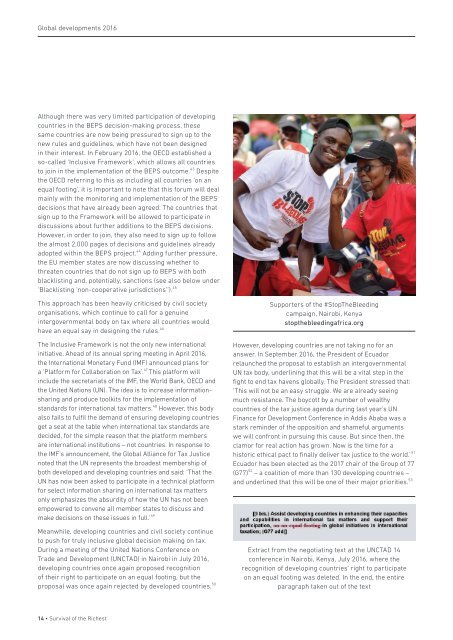You also want an ePaper? Increase the reach of your titles
YUMPU automatically turns print PDFs into web optimized ePapers that Google loves.
Global developments 2016<br />
Although <strong>the</strong>re was very limited participation <strong>of</strong> developing<br />
countries in <strong>the</strong> BEPS decision-making process, <strong>the</strong>se<br />
same countries are now being pressured to sign up to <strong>the</strong><br />
new rules and guidelines, which have not been designed<br />
in <strong>the</strong>ir interest. In February 2016, <strong>the</strong> OECD established a<br />
so-called ‘Inclusive Framework’, which allows all countries<br />
to join in <strong>the</strong> implementation <strong>of</strong> <strong>the</strong> BEPS outcome. 43 Despite<br />
<strong>the</strong> OECD referring to this as including all countries ‘on an<br />
equal footing’, it is important to note that this forum will deal<br />
mainly with <strong>the</strong> monitoring and implementation <strong>of</strong> <strong>the</strong> BEPS<br />
decisions that have already been agreed. The countries that<br />
sign up to <strong>the</strong> Framework will be allowed to participate in<br />
discussions about fur<strong>the</strong>r additions to <strong>the</strong> BEPS decisions.<br />
However, in order to join, <strong>the</strong>y also need to sign up to follow<br />
<strong>the</strong> almost 2,000 pages <strong>of</strong> decisions and guidelines already<br />
adopted within <strong>the</strong> BEPS project. 44 Adding fur<strong>the</strong>r pressure,<br />
<strong>the</strong> EU member states are now discussing whe<strong>the</strong>r to<br />
threaten countries that do not sign up to BEPS with both<br />
blacklisting and, potentially, sanctions (see also below under<br />
‘Blacklisting ‘non-cooperative jurisdictions’’). 45<br />
This approach has been heavily criticised by civil society<br />
organisations, which continue to call for a genuine<br />
intergovernmental body on tax where all countries would<br />
have an equal say in designing <strong>the</strong> rules. 46<br />
The Inclusive Framework is not <strong>the</strong> only new international<br />
initiative. Ahead <strong>of</strong> its annual spring meeting in April 2016,<br />
<strong>the</strong> International Monetary Fund (IMF) announced plans for<br />
a ‘Platform for Collaboration on Tax’. 47 This platform will<br />
include <strong>the</strong> secretariats <strong>of</strong> <strong>the</strong> IMF, <strong>the</strong> World Bank, OECD and<br />
<strong>the</strong> United Nations (UN). The idea is to increase informationsharing<br />
and produce toolkits for <strong>the</strong> implementation <strong>of</strong><br />
standards for international tax matters. 48 However, this body<br />
also fails to fulfil <strong>the</strong> demand <strong>of</strong> ensuring developing countries<br />
get a seat at <strong>the</strong> table when international tax standards are<br />
decided, for <strong>the</strong> simple reason that <strong>the</strong> platform members<br />
are international institutions – not countries. In response to<br />
<strong>the</strong> IMF’s announcement, <strong>the</strong> Global Alliance for Tax Justice<br />
noted that <strong>the</strong> UN represents <strong>the</strong> broadest membership <strong>of</strong><br />
both developed and developing countries and said: ‘That <strong>the</strong><br />
UN has now been asked to participate in a technical platform<br />
for select information sharing on international tax matters<br />
only emphasizes <strong>the</strong> absurdity <strong>of</strong> how <strong>the</strong> UN has not been<br />
empowered to convene all member states to discuss and<br />
make decisions on <strong>the</strong>se issues in full.’ 49<br />
Meanwhile, developing countries and civil society continue<br />
to push for truly inclusive global decision making on tax.<br />
During a meeting <strong>of</strong> <strong>the</strong> United Nations Conference on<br />
Trade and Development (UNCTAD) in Nairobi in July 2016,<br />
developing countries once again proposed recognition<br />
<strong>of</strong> <strong>the</strong>ir right to participate on an equal footing, but <strong>the</strong><br />
proposal was once again rejected by developed countries. 50<br />
Supporters <strong>of</strong> <strong>the</strong> #StopTheBleeding<br />
campaign, Nairobi, Kenya<br />
stop<strong>the</strong>bleedingafrica.org<br />
However, developing countries are not taking no for an<br />
answer. In September 2016, <strong>the</strong> President <strong>of</strong> Ecuador<br />
relaunched <strong>the</strong> proposal to establish an intergovernmental<br />
UN tax body, underlining that this will be a vital step in <strong>the</strong><br />
fight to end tax havens globally. The President stressed that:<br />
‘This will not be an easy struggle. We are already seeing<br />
much resistance. The boycott by a number <strong>of</strong> wealthy<br />
countries <strong>of</strong> <strong>the</strong> tax justice agenda during last year’s UN<br />
Finance for Development Conference in Addis Ababa was a<br />
stark reminder <strong>of</strong> <strong>the</strong> opposition and shameful arguments<br />
we will confront in pursuing this cause. But since <strong>the</strong>n, <strong>the</strong><br />
clamor for real action has grown. Now is <strong>the</strong> time for a<br />
historic ethical pact to finally deliver tax justice to <strong>the</strong> world.’ 51<br />
Ecuador has been elected as <strong>the</strong> 2017 chair <strong>of</strong> <strong>the</strong> Group <strong>of</strong> 77<br />
(G77) 52 – a coalition <strong>of</strong> more than 130 developing countries –<br />
and underlined that this will be one <strong>of</strong> <strong>the</strong>ir major priorities. 53<br />
Extract from <strong>the</strong> negotiating text at <strong>the</strong> UNCTAD 14<br />
conference in Nairobi, Kenya, July 2016, where <strong>the</strong><br />
recognition <strong>of</strong> developing countries’ right to participate<br />
on an equal footing was deleted. In <strong>the</strong> end, <strong>the</strong> entire<br />
paragraph taken out <strong>of</strong> <strong>the</strong> text<br />
14 • <strong>Survival</strong> <strong>of</strong> <strong>the</strong> <strong>Richest</strong>


